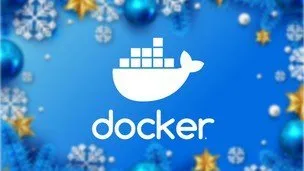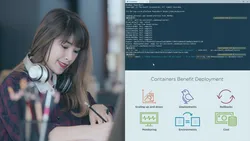
Docker Essentials 
Gain the essential skills to containerize and orchestrate applications with Docker Ecosystem. This course covers Docker, Compose and Swarm, providing hands-on experience to help you become a Docker expert. ▼
ADVERTISEMENT
Course Feature
![]() Cost:
Cost:
Free
![]() Provider:
Provider:
Udemy
![]() Certificate:
Certificate:
No Information
![]() Language:
Language:
English
![]() Start Date:
Start Date:
On-Demand
Course Overview
❗The content presented here is sourced directly from Udemy platform. For comprehensive course details, including enrollment information, simply click on the 'Go to class' link on our website.
Updated in [March 06th, 2023]
1. Comprehensive Understanding of Containers and Docker: Learners can gain an in-depth understanding of containers and Docker, and learn how to use Docker on development and/or production environment with help of in-depth labs. Through the carefully arranged and creatively illustrated sequence of topics, learners can gain a comprehensive understanding of the Docker Ecosystem, including Dockerfile and Docker Compose file.
2. Hands-on Experience: Learners can gain hands-on experience with Docker command line, files and applications through more than 30 demonstrations. They can also create custom Docker images using Dockerfiles, manage their own Docker hub repository along with images, work with Docker Networks and Storage provisions, and create and run multi-container applications using Docker Compose.
3. Test Understanding: Learners can test their understanding of the Docker Ecosystem with 7 quizzes. This will help them to identify any misconceptions they may have and correct them.
4. Basic Linux Knowledge: Learners only need very basic knowledge of Linux fundamentals like files and processes along with a bit of Linux command line to take this course. This makes it accessible to a wide range of learners.
5. Enjoyable Learning Journey: This course takes learners on an enjoyable journey of learning Containers using key components of Docker Ecosystem. By the end of this course, learners will be able to understand and appreciate Containers and Docker like a thorough enthusiast and work with them like a pro!
[Applications]
After this course, participants can apply their knowledge of Docker Essentials to create and manage Docker containers, images, networks, and storage provisions. They can also use Docker Compose to create and run multi-container applications, and manage Docker Swarm clusters. Participants can also use the Docker CLI efficiently and create custom Docker images using Dockerfiles. Additionally, they can manage their own Docker hub repository along with images.
[Career Paths]
Recommended Career Paths:
1. Docker Developer: Docker Developers are responsible for creating and maintaining Docker images and containers. They must have a strong understanding of the Docker ecosystem and be able to develop and deploy applications using Docker. The demand for Docker Developers is increasing as more organizations are adopting containerization technologies.
2. Docker Architect: Docker Architects are responsible for designing and implementing Docker-based solutions. They must have a deep understanding of the Docker ecosystem and be able to design and deploy applications using Docker. The demand for Docker Architects is increasing as more organizations are looking to leverage containerization technologies.
3. DevOps Engineer: DevOps Engineers are responsible for automating and managing the deployment of applications using Docker. They must have a strong understanding of the Docker ecosystem and be able to develop and deploy applications using Docker. The demand for DevOps Engineers is increasing as more organizations are looking to leverage containerization technologies.
4. Cloud Engineer: Cloud Engineers are responsible for managing and deploying applications on cloud platforms such as AWS, Azure, and Google Cloud Platform. They must have a strong understanding of the Docker ecosystem and be able to develop and deploy applications using Docker. The demand for Cloud Engineers is increasing as more organizations are looking to leverage containerization technologies.
[Education Paths]
Recommended Degree Paths:
1. Bachelor of Science in Computer Science: This degree path provides students with a comprehensive understanding of computer science fundamentals, including programming, software engineering, and computer architecture. It also covers topics such as artificial intelligence, machine learning, and data science. This degree path is ideal for those interested in developing and deploying applications using Docker and other container technologies.
2. Master of Science in Cloud Computing: This degree path provides students with an in-depth understanding of cloud computing technologies, including virtualization, containerization, and orchestration. It also covers topics such as distributed systems, cloud security, and cloud architecture. This degree path is ideal for those interested in developing and deploying applications using Docker and other container technologies in the cloud.
3. Master of Science in Data Science: This degree path provides students with a comprehensive understanding of data science fundamentals, including data mining, machine learning, and data visualization. It also covers topics such as big data analytics, natural language processing, and deep learning. This degree path is ideal for those interested in developing and deploying applications using Docker and other container technologies for data-driven applications.
Developing Trends:
1. Automation: Automation is becoming increasingly important in the development and deployment of applications using Docker and other container technologies. Automation tools such as Kubernetes and Docker Swarm are becoming more popular for managing containerized applications.
2. Cloud Computing: Cloud computing is becoming increasingly important for the development and deployment of applications using Docker and other container technologies. Cloud providers such as Amazon Web Services, Microsoft Azure, and Google Cloud Platform are offering managed services for containerized applications.
3. Security: Security is becoming increasingly important for the development and deployment of applications using Docker and other container technologies. Security tools such as SELinux, AppArmor, and Seccomp are becoming more popular for securing containerized applications.
Pros & Cons

Good revision on concepts.

Well explained and documented.

Deep explanations and useful examples.

Helps understand Docker Swarm.

Valuable information and expertly presented.

Teaches fundamentals of Docker.

Interdependent lectures not documented.

Highspeed training.

Gaps in knowledge.
Course Provider

Provider Udemy's Stats at AZClass
Discussion and Reviews
0.0 (Based on 0 reviews)
Explore Similar Online Courses

Geoscience: the Earth and its Resources

How to Make a Wordpress Website - Step by Step!!

Python for Informatics: Exploring Information

Social Network Analysis

Introduction to Systematic Review and Meta-Analysis

The Analytics Edge

DCO042 - Python For Informatics

Causal Diagrams: Draw Your Assumptions Before Your Conclusions

Whole genome sequencing of bacterial genomes - tools and applications

Managing Docker on Linux Servers

Fundamentals of Docker and Kubernetes for NET Developers

WSL 2 Docker Kali Linux and Windows Terminal - get started
 Related Categories
Related Categories
 Popular Providers
Popular Providers
Quiz
 Submitted Sucessfully
Submitted Sucessfully
1. What is the main purpose of this course?
2. What is the prerequisite for this course?
3. How many demonstrations are included in this course?
4. What is the purpose of this course?
Correct Answer: To learn Hands-on Containerization and Orchestration with Docker Ecosystem (Docker, Compose and Swarm)


Start your review of Docker Essentials